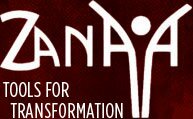How do we tackle complex issues of poverty in a meaningful way? How can we make the most impact with limited resources? Social entrepreneur and Harvard graduate Megan White has been living and working in Kenya for the last decade, wrestling with these questions. The result is ZanaAfrica (ZanaA, pronounced zah’-nah), a 501(c)3 public charity with a mission to identify and scale up African-led innovations to achieve national, replicable, and sustainable solutions to poverty in the nexus of health, education, and environment.
ZanaAfrica was founded in 2007, but its seeds were sown as early as 2001. Since moving to Kenya from New England nearly a decade ago, Megan has been involved in several projects that made her aware of the unique challenges facing girls living in impoverished areas in Nairobi’s slums, and some of the ways NGOs are failing.
Megan tried really hard not to start another NGO – after all, there are already somewhere around 3,500 NGOs in Kenya serving East Africa. Yet, as a professional committed to Kenya, and she started forming some theories of change that she wanted to put into action, while also thinking for seven years about the best way to sustainably address the challenge that menstruation brought to girls trying to continue with school. The combined issues of policy, distribution, environmental responsible pads, local manufacturing, and reproductive health education were immense, but she believed inherently solvable and the perfect beginning to put into action her convictions. With the right approach, and the right partnership across sectors, and redefining what NGOs are meant to look like, she believed it could be done.
So, Megan helped to launch a global first on Valentine’s Day 2006: The National Sanitary Towels Campaign. In her capacity as then-incoming President of the Rotary Club of Nairobi South, she brought together the Girl Child Network, the Ministry of Education, Proctor and Gamble, and other key stakeholders to raise awareness about the reality that over 600,000 girls were missing over 3 million learning days every month, and to mobilze people for action. This had several positive results:
- P&G decided to launch a major multi-million dollar investment by P&G to donate free sanitary pads to girls across the continent (including the Protecting Futures ad campaign in the US and Canada in the fall of 2007)
- GCN and the Forum for African Women Educationalists (FAWE) were further empowered to work with the Ministry of Education to create a Gender Policy in Education in 2007
- Rotary took the project of sanitary pads provision to a district level (across East Africa) and committed a goal of providing 160,000 girls with annual supplies, formulating a packet of sanitary pads and underwear with H.E.A.R.T, run by Rotarian Vicky Winkler, which was the first annual supply of pads in a convenient, low-cost packet
- The creation of the National Sanitary Towels Campaign Coordinating Committee (NSTCCC) in 2008 of which Megan is a founding and continued active member. In February 2009 the NSTCCC appointed Megan to create an online coordinating mechanism for all distributors to facilitate accountability and equitable distribution nation-wide.
Megan had a further belief that this online system could be leveraged to provide real-time data on attendance, performance, and matriculation to create the world’s first longitudinal study on the impact of sanitary pad provision (and other key interventions) on girls’ educational attainment and thereby further help policy advocacy for girls. In 2010 this plan for monitoring and evaluation was funded by the Girl Effect and is being tested now.
American Friends of ZanaAfrica was made a reality through Megan’s friend Christina Winters, who was living in New York after having come back from living in India and China and wanted to make a difference internationally from New York. They had been friends and classmates since nursery school, and together formed a Board. Christina led our first fundraiser, a Halloween costume party at Tavern on the Green, in 2007, which raised over $16,000 to launch ZanaA. A second fundraiser in Nairobi in November 2008 launched the local presence of ZanaAfrica Group in Kenya.
Megan then began working with Professor Moses Musaazi and his company Technology for Tomorrow in Uganda and became the exclusive distributor of his papyrus-based sanitary pads, MakaPads, for the informal market. However, these pads are still too expensive, not as modern as most Kenyan girls want, and have not yet been approved by Kenya Bureau of Standards. Other inventors approached ZanaA, and the result was a business plan for manufacturing and distribution that won the 2009 Wharton Africa Business Forum Business Plan Competition and was heralded as “game-changing for Africa” by the panel of venture capitalist and private equity judges.
Meanwhile, many youth with whom Megan had worked since 1998 were Secondary School finishers, and together they crafted the Empowerment program alongside the microfinance-for-university program from Kibera. This combined program keeps us rooted in communities and schools, and helps us test our monitoring and evaluation tools and refine best practices in distribution of sanitary pads and reproductive health information to school girls. The Girl Effect in 2011 helped to transform our Empowerment Clubs to EmpowerNet Clubs, and gave us valuable time to revise our program delivery manual and strategy.
This website is the result of all our thoughts and most of our activities (some are yet to be publicly promoted).
Please poke around on our site and learn more, or follow our blogs and get the latest news hot off the press.









